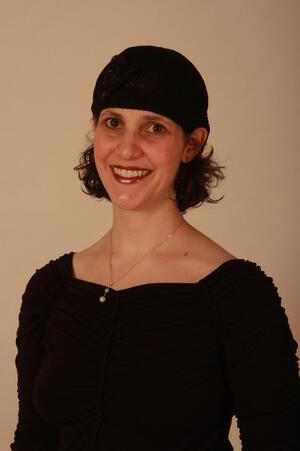Connecting Across the Divide
The first of the historic events that marked our trip took place on the second evening at Berlin’s Centrum Judaicum. For the first time, the pioneering American women rabbis who were the first to be ordained by their denominations joined with their counterparts in Europe in a public forum to talk about their journeys to the rabbinate and experiences as rabbis. Or that was the plan.
Late into the night before the panel, it became clear that Rabba Sara Hurwitz would not be present. The cancellation and disruption of flights from Israel due to rocket threats and the FAA ban made it impossible for Rabba Hurwitz, who was in Jerusalem studying and teaching at the Hartman Institute, to fly to Berlin as planned.
But the determination that has characterized Rabba Hurwitz’ career to date, as well as the commitment of the evening’s organizers to pluralism, ensured that a way would be found to include her in the evening.
Sitting on the stage, I was able to watch people as they listened attentively to Rabba Hurwitz speak to us via cell phone. The unsophisticated technology of our connection made no difference. What mattered was that she connected to us and we to her; that she did not feel isolated, and that, through her, we did not feel cut off from Israel.
After noting her sadness over not being able to be with us in person and her sorrow over the pain and suffering around her, Rabba Hurwitz thanked her rabbinic colleagues:
“I am so grateful to the women, my rabbinic colleagues, with whom I was supposed to share the stage tonight. I am indebted to each of you for opening up and paving the derech, the path, for me to follow. And to all those who organized this trip, in honor of Regina Jonas, thank you for bringing us together in Rabbiner Jonas’s z’chut, in her merit. Although her voice was silenced, we live on to bring forth her Torah and actualize her vision.”
Her own path, she explained, did not begin with the “Aha moment” of wanting to be a rabbi.
"Growing up in a traditional family, there were no female Orthodox rabbis, no role models for me to emulate. Before I went to college my parents insisted that I take a vocational test so that I would be directed towards a career path. The result of the test showed that I would be best suited for clergy. I laughed. An Orthodox women working in a shul as a spiritual leader? That just didn’t exist!"
And yet, she noted, she “was always drawn to building community.” After working with Rabbi Avi Weiss as a part-time congregational intern at the Hebrew Institute of Riverdale, she “found [her] calling and began to dream with Rabbi Weiss about the possibility of [her] becoming a full member of the rabbinic staff in our Orthodox synagogue”:
“We didn’t know if people would accept my authority, or allow me to officiate at life-cycle events. The only thing we knew for certain was that I would have to immerse myself deeper into our rich tradition so that I could guide and help others.”
After five more years of study, she was ordained in 2009 by Rabbi Avi Weiss and Rabbi Daniel Sperber. Responding to other women inspired by her ordination and interested in following in her footsteps, she and Rabbi Weiss sent out a call for applications for Yeshivat Maharat, intent on ordaining more Orthodox women.
“We did not know what to expect, but many answered the call and today Yeshivat Maharat is a thriving program, with 20 students studying towards ordination, and five who have already graduated and are serving and teaching Torah in communities throughout North America.”
Rabba Hurwitz concluded her remarks by noting the change that must happen in the Orthodox community:
“It is simply no longer tenable to expect women to continue to be comfortable playing prominent roles in their professional lives and secondary roles in their communities. In the past, we have prevented women from realizing their share of the Torah, and in doing so we have withheld Torah from our community. But now, thanks to Rabbiner Jonas’s courage, and all who have followed in her footsteps, we are guaranteeing that the Torah of women not only survives, but thrives.
During Birkat HaKohanim, the blessing of the priests, there is a custom to read the refrain: Chalom chalamti, v’ayni yodayha ma hu—I dreamt a dream, but I do not know what it means. Today, I know that the dream of Orthodox women being equal participants in the communal conversation has finally become a reality.”



